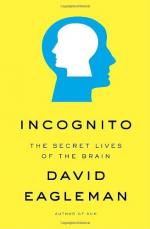
|
| Name: _________________________ | Period: ___________________ |
This test consists of 15 multiple choice questions and 5 short answer questions.
Multiple Choice Questions
1. What does Alberts record?
(a) The sounds of the lions.
(b) The sounds of the insect world of Africa.
(c) The sounds of many bird species.
(d) African music.
2. When does Arthur Alberts travel from New York to Africa?
(a) 1997.
(b) 1989.
(c) 1949.
(d) 2004.
3. What happens to May after some time of having his sight back?
(a) He never really adjusts and went to wearing a mask over his eyes.
(b) He learns to make sense of the visual world.
(c) He makes sense of the world in a different way than lifelong sighted people.
(d) He learns to interpret the world around him except for objects in the distance.
4. What are our brains wired to do as far as complicated tasks are concerned?
(a) Study the task carefully and then consciously decide which part of the brain would be best to perform the task.
(b) To consciously send the task to the unconscious mind to learn and then teach the conscious mind.
(c) Let the unconscious mind perform the task.
(d) To take the task apart and consciously learn it in steps.
5. What is difficult to do when it comes to sorting young chickens?
(a) Catching a chicken if it gets loose.
(b) Determining sex.
(c) Keeping the mother from pecking you.
(d) Keeping the chickens grouped.
6. What is one of the types of cells in the brain?
(a) Nephrons.
(b) Hepatic.
(c) Neurons.
(d) Erythrocytes.
7. Why did the subjects say about why they chose the pictures of the women that they did?
(a) They had various reasons but none mentioned dilated eyes.
(b) All the men mentioned the dilated eyes.
(c) The men were not asked why they chose the pictures.
(d) Only two mentioned that they thought women's eyes were sexier dilated.
8. How much of our brain is devoted to sight?
(a) 1/20.
(b) 1/15.
(c) 1/3.
(d) 1/10.
9. When does the conscious mind actively train the unconscious mind?
(a) When the unconscious mind shows signs of dysfunction.
(b) When there is a complicated task to learn.
(c) When there is a repetitive task to learn that the unconscious can do efficently.
(d) When the conscious mind shows signs of dysfunction.
10. What gap does Eagleman explore?
(a) Between what your eyes see and what your brain shows you.
(b) Between what your brain knows and your mind is capable of accessing.
(c) Between what you want to see and what is actually there.
(d) Between what your brain receives in impulses and what it can interpret.
11. What do dilated eyes have to do with the experiment the author mentions?
(a) It is a way to tell if the participant is looking directly at the computer screen.
(b) The men were more attracted to women with dilated eyes.
(c) Dilated eyes have nothing to do with the experiment.
(d) It is a measure of the light used.
12. What does Eagleman say is the correct way to do this motion?
(a) Steer to the left, then straighten the wheel, then turn to the right.
(b) Use a reference point to scribe the circle.
(c) Move first clockwise, then counterclockwise.
(d) Steer to the right, then straighten the wheel, then turn to the left.
13. What does the device that takes visual input through a camera and translate it into impulses do?
(a) It demonstrates the mechanics of sight.
(b) It is a means of giving a computer "sight."
(c) It enables the brain to see without eyes.
(d) There is no such machine.
14. How does Alberts convince one African that the native's tongue is still intact?
(a) Pulling on the tongue in question.
(b) Having the man sing.
(c) Having the man hold his tongue and try to talk.
(d) Using a mirror.
15. How does one device "show" a blind person his/her proximity to objects?
(a) It gives a slight electrical shock to the person's arm where it is attached.
(b) It uses a series of electrodes on the back that pulsed in different ways according to the person's proximity to objects.
(c) It pushes the person in one direction or another when it senses an obstacle.
(d) It beeps when its sensors notice an object in the person's path.
Short Answer Questions
1. How much of the activity of our brain does the conscious mind represent?
2. What does Eagleman say can happen even after we learn to see?
3. What does the author say lies underneath one's exterior looks?
4. What tells us that we experience the world as it actually exists?
5. To what are innumerable facets of ourselves linked?
|
This section contains 766 words (approx. 3 pages at 300 words per page) |

|




